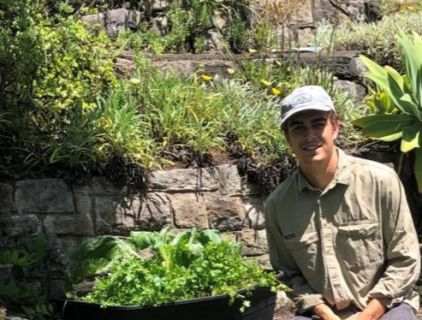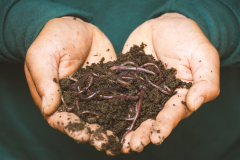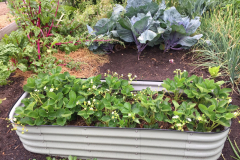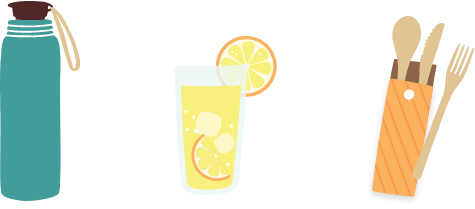Reducing plastic in the garden
The Plastic Free July Team | 2 February 2021
Want to cut down on plastic usage in daily life? Make sure your garden doesn’t go neglected. Many people find when they use less plastic in their garden, it will, in turn, produce less waste, and will also keep plastic chemicals from percolating into the soil.
Usually, when you buy a plant from a nursery, it comes in a single-use plastic pot that gets discarded right after. While a few of them can be kept for potting on seedlings, people often find others in their community such as market stalls that are happy to receive donated pots for reuse. Many people look for nurseries where they take pots back for recycling to buy their plants or your local recycling facilities which can take new taupe coloured pots for recycling.
Here are some ideas to reduce plastic waste in the garden:
- Pick non-plastic growing containers. Do you grow your plants in a container? If yes, stop buying new plastic pots and look for second hand or consider buying terracotta, ceramic, wood, or metal. You can even use metal tubs or oak barrels for this purpose. Other ideas include using repurposed items such as eskies or coolers or even used olive oil tins that have been discarded.
- Choose plastic free (and second hand) tools and gear. When you must choose between metal/wood tools and fragile plastic tools, consider more durable materials such as metal or wood tools, that are unlikely to wear out in a few months.
- Share tools used less frequently. One smart way to cut down plastic in gardening is to start sharing tools with your neighbours or garden-group members. Some communities find a tool sharing point from where any of the members can borrow whatever tools they need and return while others have informal arrangements with their neighbours. This will reduce the purchasing of plastic, and in fact, tools in general.
- Use plastic-free weed barriers. Try not to use plastic sheeting because it suppresses the weeds, keeps the moisture away from plants, and can percolate chemicals into the soil. Consider using cardboard or paper covered with mulch. Another option is reused burlap sacks from organic coffee roasters, which are biodegradable and provide nutrition to the soil as well.
- Get creative with row and plant markers. Instead of using plastic markers, make a difference with creative DIY markers such as clay or hand-painted rocks, or use sturdy sticks or reused shims, pieces of broken terracotta pots, popsicle sticks, or inexpensive spoons.
- Choose non-plastic seed packets. Fortunately, most of the seeds come in paper packets, so it is not difficult to cut down plastic usage in this manner. Consider swapping with your neighbours and friends.
- Get plastic-free raised beds. Avoid using plastic in your raised beds and rather go for high-quality cedar raised beds, which not only adds beauty but also makes it function well. You can also make your own raised bed with hardwood, corrugated iron or purchase second hand.
- Composting. Composting is a great way to reduce waste and add nutrients to the soil, thus avoiding buying compost in plastic bags. All materials should be either carbon (dried leaves, twigs, paper) or nitrogen-based (food scraps, lawn clippings, manure). It is very essential to maintain a balance between these two elements in a compost pile. The best ratio for a healthy compost pile is more carbon to nitrogen, about 2/3 to 1/3.
- Homemade fertiliser. Fertilisers are something I have enjoyed making and have found them to be very effective. Usually, the three things that you need to make fertilizer are poultry manure, grass clipping, and water. Poultry manure, grass clippings, or dry organic fertiliser can provide a vast range of nutrients. These homemade fertilisers can also be made by mixing and matching different materials of your own choice.
- Using newspaper pots. Self-made newspaper pots are so beneficial because the transplant shock gets lessened when your seeds are ready to transplant outdoors. You just need to make sure that the bottoms of the newspaper pots have drainage holes. Dig your planting hole and put the seedling, pot and all, straight into the whole with some water. The newspaper degrades into the soil as the seedling grows to provide instant mulch and fertilizer to the plant.
What to do with plastic pots you may already have? The ultimate fate of the black plastic pots is dumping them into garbage but before dumping you can use them for various purposes like propping up small containers, for shaking and dispersing fertilizer, mulch protection, scooping the soil, or instant frost protection. They can also be used as durable lightweight fillers or as liners for containers with no drainage.
Plastic waste has been a growing problem in the past decades. From disposable utensils to supermarket bags, all plastic-based materials go to waste eventually. Unlike other waste and the natural chemistry of plastic, it becomes an arduous task to dispose of it. Gardening; however, is not unblemished from the use of plastics. With the given problem at hand, gardening can have a suitable replacement to minimise the use of plastic.
The thought of plastic-free gardening seems a little bizarre but it is not that big of a deal. You just need to swap some things and you will be able to enjoy a plastic-free gardening experience. This way you will get to feel satisfaction in two ways, cultivating a healthy garden and the knowledge that you have made a difference to a world without plastic waste.
Tips courtesy of Tristan Kavanagh from Sydney Gardeners, he is passionate about sustainability and the environment. His passion has grown from his experience working in nature. You can view more of his works here.






